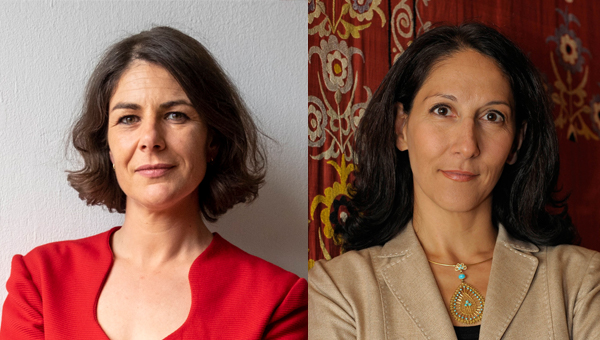Farian Sabahi and Costanza Hermanin Join Guarini Institute Advisory Council
Farian Sabahi is a historian specialized in the Middle East, with a background in Economics and Business. She is a lecturer at the Università della Valle d’Aosta and the Università degli Studi dell’Insubria (Varese, Italy). Costanza Hermanin is Visiting Professor in the Department of Political Science and International Affairs of John Cabot University. Thanks to her experience in Paris, Brussels, Berlin, and the United States, she has become a firm believer that multicultural environments are the best for self-development. Sabahi and Hermanin have recently become members of the Guarini Institute Advisory Council.
Tell us about yourself.
Sabahi: My areas of expertise are Pahlavi Iran, education in Iran during the 1963-1979 period, gender issues in the Muslim world, history of Yemen in the 20th century, and the current political and economic situation in Iran and Yemen. I am currently working as a business consultant in the Middle East, Caucasus and Central Asia (mainly Uzbekistan). I also cover the situation in Iran for the Italian newspapers II Manifesto and II Corriere della Sera, and I report for the Italian television channel RaiNews24 and for several radio stations.
Hermanin: I’ve had the opportunity to study in three different university systems: Italian, French, and Anglo-Saxon (the US and Europe). The three systems apply very different didactic methods and I have developed my approach to teaching as a mix of the three. This allows me to focus on the development of the students and their skills, in addition to transferring knowledge.
What are your thoughts about the current political situation in the Middle East?
Sabahi: I believe that the situation in the Middle East is very complicated. The recent assassination of General Qassem Soleimani, commander of Iran’s Quds Force, will not bring peace to the region, and ISIS and other jihadi organizations will likely take advantage of the current scaling down of Western troops in Iraq. Moreover, Shia militias in Iraq will probably try to get revenge for the assassination of Abu Mahdi al-Muhandis, Deputy Chief of the Popular Mobilization Committee and commander of the Kataib Hezbollah militia.
Hermanin: I feel disillusioned about the situation in Iran: some foreign policy choices have put in danger much of the recent progress. Although I’m not a supporter of the latest foreign policy choices of the United States, I think that Iran too has responsibilities and internal problems, such as protests, that have led to specific responses.
What can you tell us about Iran’s internal situation?
Sabahi: The leadership of the Islamic Republic of Iran will take every opportunity to gain more consensus from the population. The next show of ‘ayatollahs’ and ‘pasdaran’ will take place on February 11, 2020. On the same day, the Islamic Republic of Iran will turn 41, and millions of Iranians will probably go out in the streets to commemorate, according to the Shia tradition, the 40th day since General Soleimani’s assassination.
As a professor teaching “the Politics of Gender” at JCU, how do you feel about the increasing number of women on the Guarini Institute Advisory Council?
Hermanin: I believe that the increasing involvement of women in academia and politics is something to celebrate. I’m happy that the Guarini Institute has such a large participation of women, as they can bring new perspectives and approaches to the table, especially in disciplines such as International Affairs and Security, where they are constantly underrepresented. Underrepresentation is not a consequence of an innate lack of interest for these subjects, but rather a consequence of a traditional societal model, which needs to be challenged.






